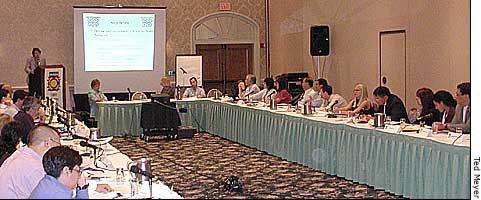
August 15, 2001
More than 50 participants from around the United States attended the 2nd Annual Redes En Acción National Steering Committee Meeting August 15-17, 2001 in San Antonio. Dr. Amelie Ramirez, Deputy Director of the Chronic Disease Prevention and Control Research Center (CDPCRC), is Principal Investigator of the National Cancer Institute-funded Redes program. Several speakers and panels were on this year’s meeting agenda, covering a host of topics involving the Redes goals promoting Latino cancer research, training and awareness. Serving as Honorary Chair of the National Steering Committee was U.S. Congressman Ciro Rodriguez, who provided meeting participants with an update on the Congressional Hispanic Caucus’s Health Task Force. In addition, speakers included longtime Texas Representative Irma Rangel, who is a breast and ovarian cancer patient, and Dr. Francisco Cigarroa, President of the University of Texas Health Science Center at San Antonio and the first Latino head of a health science center in the country. Discussing the new National Center on Minority Health and Health Disparities was Center Director Dr. John Ruffin. Also, Dr. Armin Weinberg, CDPCRC Director, provided insight into national cancer dialogues and initiatives. The Redes En Acción National Steering Committee membership represents a cross-section of renowned cancer experts and authorities from various fields, including scientists, academicians, and leading Latino health and communications experts. Members also represent governmental agencies, including the Department of Health and Human Services, National Cancer Institute, and Centers for Disease Control and Prevention. Organizations represented include the National Council of La Raza, American Cancer Society, Latino Council on Alcohol and Tobacco, Susan G. Komen Breast Cancer Foundation, Grant Makers in Health, and Hispanic Nurses Association.
What Is Redes En Acción? Redes En Acción is a major NCI-supported initiative to combat cancer among Latinos through a nationwide network of community-based organizations, research institutions, government health agencies and the public. Core activities include promoting cancer training and research opportunities for Latino students and researchers, generating research projects on key Latino cancer issues, and supporting cancer awareness activities within the Latino community.
The initiative is coordinated by the Baylor College of Medicine in Houston and San Antonio, with regional network centers in San Antonio, New York, Miami, Chicago, San Francisco and San Diego.



